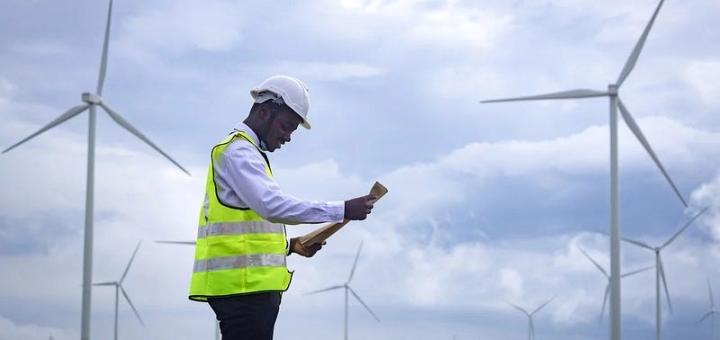The Development Bank of Nigeria (DBN) has launched a landmark initiative known as the “Green Declaration,” a strategic commitment to promote sustainable development and climate finance in Nigeria. This bold move aligns with global efforts to combat climate change while positioning Nigeria as a proactive player in transitioning to a low-carbon, climate-resilient economy.
The announcement was made during a high-level climate finance forum in Abuja, where DBN’s leadership outlined its plans to integrate environmental sustainability into its core operations. The Green Declaration aims to mobilize investments, build partnerships, and support businesses that are actively contributing to Nigeria’s green economy goals.
Speaking at the event, Tony Okpanachi, Managing Director/CEO of DBN, described the initiative as more than just a symbolic gesture. “The Green Declaration is a concrete call to action,” he said. “It’s our pledge to align DBN’s operations with climate-smart principles and ensure that our interventions have a meaningful impact on Nigeria’s sustainable development trajectory.”

The declaration underscores DBN’s commitment to supporting Nigeria’s Nationally Determined Contributions (NDCs) under the Paris Agreement, which outlines the country’s targets for reducing greenhouse gas emissions and adapting to the effects of climate change. As part of the plan, DBN intends to prioritize funding for projects in renewable energy, sustainable agriculture, green manufacturing, and climate-resilient infrastructure.
One of the key objectives of the Green Declaration is to close the climate finance gap by unlocking new sources of capital for green projects. This includes mobilizing funds from both public and private sector actors, international development partners, and climate finance facilities like the Green Climate Fund (GCF), for which DBN is already an accredited entity. Through this accreditation, DBN has successfully mobilized around $250 million in funding, specifically earmarked for climate-resilient projects across the country.
The need for such interventions is urgent. Nigeria, like many other African nations, is highly vulnerable to the effects of climate change. From increased flooding and desertification to unpredictable rainfall patterns and extreme heat, the impacts are far-reaching and disproportionately affect rural communities and low-income groups. Agriculture, a sector that employs the majority of Nigerians, is especially at risk. By channeling finance toward climate-smart agriculture, DBN hopes to enhance food security while protecting livelihoods.
Another core focus of the Green Declaration is inclusivity. DBN has committed to ensuring that women, youth, and underserved communities benefit from the green transition. Through targeted financial instruments and technical support, the bank intends to make climate finance more accessible to micro, small, and medium enterprises (MSMEs) operating in the green economy space. By doing so, DBN aims to promote inclusive growth and build resilience at the grassroots level.
To support the rollout of the Green Declaration, DBN is also working closely with government ministries, financial institutions, and regulatory agencies to create a policy environment that enables green investment. Okpanachi emphasized the need for collaboration across sectors. “We cannot achieve climate goals in isolation,” he said. “It will take a coalition of public and private actors, supported by coherent policies and strong institutions, to deliver meaningful change.”
The Green Declaration also calls for improved capacity-building in climate finance. DBN plans to support training programs and workshops aimed at equipping Nigerian financial institutions, project developers, and policymakers with the tools they need to structure and evaluate green investments. By fostering a deeper understanding of climate risks and sustainable financing models, DBN hopes to mainstream environmental sustainability within Nigeria’s financial system.
In line with this, the bank is also exploring the issuance of green bonds as a tool for raising capital to support environmentally friendly projects. These instruments, which are growing in popularity worldwide, allow investors to put their money into projects that generate both financial returns and environmental benefits. DBN’s interest in green bonds signals its commitment to innovation in the financial space and its desire to lead by example.
DBN’s Green Declaration dovetails with other national initiatives such as the Climate Change Act and the pending activation of the Climate Change Fund by the Federal Government. These frameworks are intended to guide Nigeria’s response to climate change and provide the necessary regulatory support for climate-related investments. DBN’s proactive stance places it in a prime position to influence and support the implementation of these national policies.
In conclusion, the Development Bank of Nigeria’s Green Declaration marks a significant step forward in the country’s efforts to achieve sustainable and inclusive economic growth. By focusing on climate finance, the initiative not only addresses environmental challenges but also opens new pathways for job creation, industrial development, and poverty reduction. As climate change continues to pose significant risks, DBN’s commitment to fostering a green economy provides a timely and hopeful roadmap for Nigeria’s future.
Support InfoStride News' Credible Journalism: Only credible journalism can guarantee a fair, accountable and transparent society, including democracy and government. It involves a lot of efforts and money. We need your support. Click here to Donate
